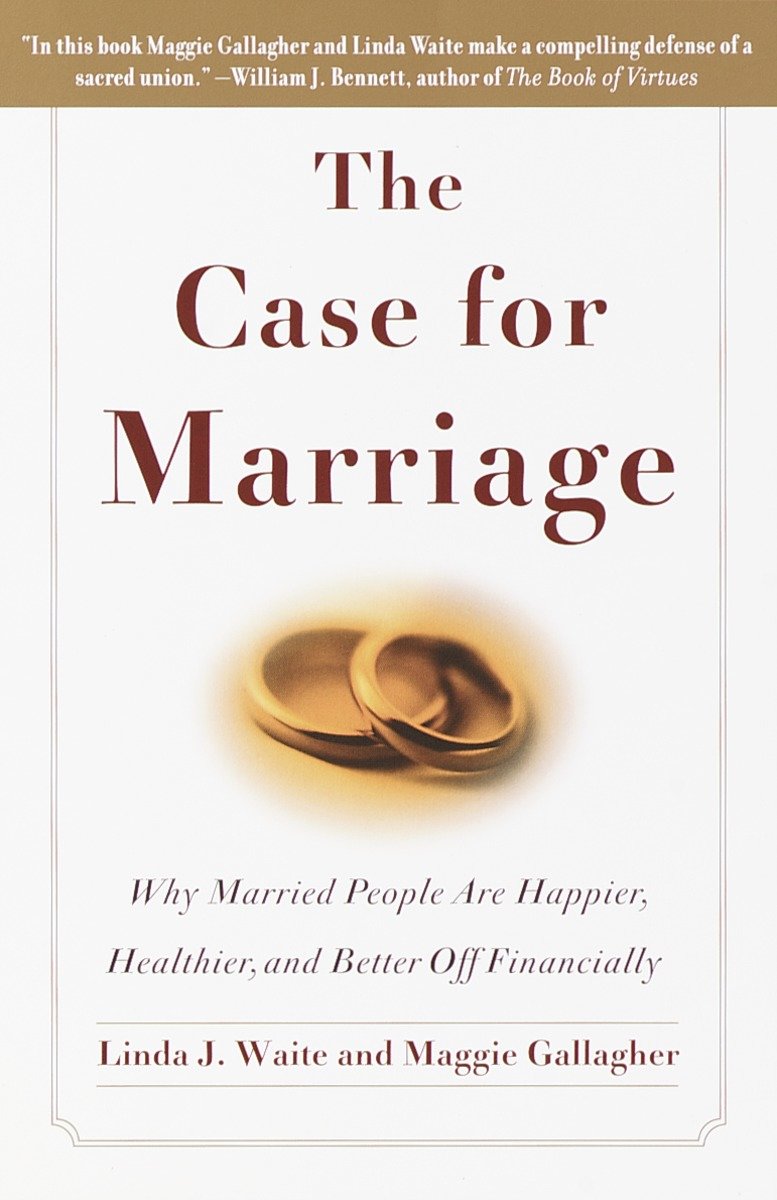The Case for Marriage: Why Married People are Happier, Healthier and Better Off Financially
16.00 JOD
Please allow 2 – 5 weeks for delivery of this item
Add to Gift RegistryDescription
A groundbreaking look at marriage, one of the most basic and universal of all human institutions, which reveals the emotional, physical, economic, and sexual benefits that marriage brings to individuals and society as a whole.The Case for Marriage is a critically important intervention in the national debate about the future of family. Based on the authoritative research of family sociologist Linda J. Waite, journalist Maggie Gallagher, and a number of other scholars, this book’s findings dramatically contradict the anti-marriage myths that have become the common sense of most Americans. Today a broad consensus holds that marriage is a bad deal for women, that divorce is better for children when parents are unhappy, and that marriage is essentially a private choice, not a public institution. Waite and Gallagher flatly contradict these assumptions, arguing instead that by a broad range of indices, marriage is actually better for you than being single or divorced– physically, materially, and spiritually. They contend that married people live longer, have better health, earn more money, accumulate more wealth, feel more fulfillment in their lives, enjoy more satisfying sexual relationships, and have happier and more successful children than those who remain single, cohabit, or get divorced.The Case for Marriage combines clearheaded analysis, penetrating cultural criticism, and practical advice for strengthening the institution of marriage, and provides clear, essential guidelines for reestablishing marriage as the foundation for a healthy and happy society.“A compelling defense of a sacred union. The Case for Marriage is well written and well argued, empirically rigorous and learned, practical and commonsensical.” — William J. Bennett, author of The Book of Virtues“Makes the absolutely critical point that marriage has been misrepresented and misunderstood.” — The Wall Street Journalwww.broadwaybooks.com
Additional information
| Weight | 0.25 kg |
|---|---|
| Dimensions | 1.58 × 13.26 × 20.3 cm |
| PubliCanadation City/Country | USA |
| Author(s) | |
| Format | |
| language1 | |
| Pages | 272 |
| Publisher | |
| Year Published | 2001-10-9 |
| Imprint | |
| ISBN 10 | 0767906322 |
| About The Author | Linda J. Waite is a professor of sociology at the University of Chicago and the author of New Families, No Families. She lives in Glencoe, Illinois.Maggie Gallagher is Director of the Marriage Program at the Institute of American Values, a nationally syndicated columnist, and the author of Enemies of Eros. She lives in New York City. |
Advance Praise for The Case for Marriage:"In this book Maggie Gallagher and Linda Waite make a compelling defense of a sacred union. The Case for Marriage is well written and well argued, empirically rigorous and learned, practical and commonsensical. It is a very valuable contribution to the debate about marriage in modern American society."-William J. Bennett, author of The Book of Virtues"Linda Waite and Maggie Gallagher have written a truly revolutionary book. Amassing powerful resources of data and theory, they attack the current anti-marriage conventional wisdom and devastate it. Married people are healthier, happier, more productive, and enjoy better sex. On reflection one wonders how anyone could have possibly thought otherwise. Future discussion of marriage and family will not be able to ignore this work, no matter how much the anti-marriage ideologues would like to."-Reverend Andrew M. Greeley, priest, sociologist, and bestselling author"This is an important book that makes the central arguments for marriage. In this cynical, high-divorce culture, this book is a MUST read for every citizen. We need to know the facts about what marriage does accomplish, and here, finally, are the facts, in understandable terms."-John Gottman, author of The Seven Principles for Making Marriage Work and Why Marriages Succeed or Fail"Is marriage just another lifestyle choice? If you think so, read this book. You will be surprised at how much harm has been done by the popular culture's seemingly benign and well-meaning efforts to characterize all family forms as equally valid. It is time to start talking about the 'M' word and this book should spark the conversation."-Isabel V. Sawhill, Senior Fellow at the Brookings Institute |
|
| Excerpt From Book | 1The Marriage Wars:Five Myths of the Postmarriage CultureIn America over the last thirty years, we've done something unprecedented. We have managed to transform marriage, the most basic and universal of human institutions, into something controversial.For perhaps the first time in human history, marriage as an ideal is under a sustained and surprisingly successful attack. Sometimes the attack is direct and ideological, made by "experts" who believe a lifelong vow of fidelity is unrealistic or oppressive, especially to women."Even in the early 1960s," sum up social historians Steven Mintz and Susan Kellogg, "marriage and family ties were regarded by the 'human potential movement' as potential threats to individual fulfillment as a man or a woman. The highest forms of human needs, contended proponents of the new psychologies, were autonomy, independence, growth, and creativity," which marriage often thwarted. The search for autonomy and independence as the highest human good blossomed with the women's movement into a critique of marriage per se, which the more flamboyant feminists denounced as "slavery," "legalized rape," and worst of all, "tied up with a sense of dependency.""From this vantage point," Mintz and Kellogg note, "marriage increasingly came to be described as a trap, circumscribing a woman's social and intellectual horizons and lowering her sense of self-esteem."Even today scholars warn, as one 1995 college textbook put it, "[M]arriage has an adverse effect on women's mental health." Reflecting both these broader trends and this expert consensus, the proportion of high-school-senior girls who agreed that most people will have fuller and happier lives if they choose legal marriage rather than staying single or just living with someone dropped about one-fourth (or ten percentage points) between 1976 and 1992, while the opinion of boys remained unchanged. Indeed, a journalist recounts the time she congratulated a twenty-four-year-old woman on her impending nuptials. "She grabbed my hand, held it, and said with emotion, 'Thank you!' As it turns out, I'd been the only woman to offer her congratulations without immediately expressing worry that she'd done the wrong thing." Her friends "simply couldn't fathom why she'd tossed away her freedom."But for the most part, the war on marriage is not a frontal assault from outside enemies but a sideways tug-of-war inside each of us between competing values: between rights and needs, between individualism and community, between fear and hope, between freedom and love. On the one hand, we cherish marriage as the repository of our deepest hopes and wishes to forge stable families, to find lasting love. On the other hand, we fear being "tied down" or "trapped" and jealously guard our right to redefine ourselves and our lives, with or without our partners' consent.Mel Harris (the actress who played Hope on thirtysomething), a twice-divorced mother who understands "the logistical problems that can only arise when dealing with three kids and six sets of parents," captures something of the ambivalence toward marriage all Americans share in varying degrees: "The other day [my son] Byron asked me if I was ever going to marry again, and I told him the truth: I don't know. . . . Some people might think I perceive marriage in a flippant way because I have been divorced twice. I'm not proud of the divorces. I feel marriage is a serious, sacred thing."Despite the startling rise in divorce, cohabitation, and unwed parenthood, marriage remains a core value and aspiration of many Americans. One might imagine that, as Professor Norval Glenn puts it, "Americans are marrying less and succeeding less often at marriage because alternatives have become more attractive, relative to marriage, than they once were." But, Glenn continues, survey data on attitudes toward marriage provide "scant evidence for it."We aren't as certain anymore about whether marriage is good for other people, but when it comes to their own life goals, Americans put marriage at the top of the list. Ninety-three percent of Americans rate "having a happy marriage" as either one of the most important, or very important objectives. Asked to select their top two goals, a majority of Americans included a happy marriage as one of the choices, far outpacing such other life goals as "being in good health" (35 percent) or even having "a good family life" (36 percent). In 1992 the number-one aspiration of high-school seniors was "having a good marriage and family life," and the proportion of seniors calling that goal "extremely important" has actually risen over the last two decades. Only 8 percent of American women consider remaining single an ideal, a proportion that has not changed over the last generation.The paradox, as Glenn writes, is that "marriage remains very important to adult Americans–probably as important as it has ever been–while the proportion of Americans married has declined and the proportion successfully married has declined even more."Americans are still the marrying kind. But our ideas about what marriage means have changed in subtle ways that undermine our ability–as individuals or as a society–to achieve the goals of wedlock, creating a lasting love between a man and a woman, and a firm bond of mutual support between a mother and a father.When it comes to marriage, Americans have both high hopes and debilitating fears. As two scholars put it after an exhaustive study of the attitudes of today's college students, "They are desperate to have only one marriage, and they want it to be happy. They don't know whether this is possible anymore."But the dreams and hopes of young Americans to forge more perfect unions are hampered by five myths that, despite the recent revival of interest in marriage, remain powerfully, if thoughtlessly entrenched in the conventional wisdom. For although marriage as an ideal still holds a firm fascination in Americans' minds, we believe that it is fair to describe America as a society on the verge of becoming a postmarriage culture. A postmarriage culture is not one in which nobody ever makes it to the altar. Rather, it is a culture in which marriage is viewed as unnecessary, or, strictly speaking, optional–a private taste rather than a matter of urgent shared concern.Five Myths of the Postmarriage CulturePostmarriage Myth 1: "Divorce is usually the best answer for kids when a marriage becomes unhappy."Whether or not parents are married, many experts believe, is not what really counts. What matters is the quality of relationship between parents and between parent and child. Staying married "for the sake of the kids" thus doesn't make sense, because if you are in an unhappy marriage, your children will probably be better off if you divorce anyway."Many parents may indeed stay together because they believe divorce will harm their children," warn therapists Mel and Pat Krantzler in the new 1998 edition of their best-seller Creative Divorce. "What they fail to realize is that . . . more harm will result from 'staying together' than divorcing."This perspective is what most experts teach and what most Americans believe these days. It is certainly true that an abundance of evidence confirms that parents who fight a lot damage their kids. But is divorce always the better answer? In chapter 9 we'll tell you what the latest research shows about the circumstances under which divorce may be better for kids than continuing a marriage. And in chapter 10 we reveal new findings about what actually happens to very unhappily married couples who decide to stick it out rather than divorce. The results will surprise you.Postmarriage Myth 2: "Marriage is mostly about children; if you don't have kids, it doesn't matter whether you cohabit or marry or stay single."Staying in an unsatisfying marriage is pure "self-sacrifice" that we say unhappy adults should, or, more often these days, should not make on their children's behalf. In chapters 4 through 9, we look at the surprising new data documenting the powerful effect getting and staying married has on the well-being of adults. We will show you how, in some cases, for some people, marriage can literally make the difference between life or death.Postmarriage Myth 3: "Marriage may be good for men, but it is bad for women, damaging their health and self-esteem and limiting their opportunities."This is one of the most powerful and widespread of postmarriage myths. Experts and ordinary women alike tend to agree these days that for women, wedlock is risky business. "[Engels's] ideas have been criticized by radical, socialist and Marxist feminists," says a 1994 textbook, "but the central argument he makes about the connection of marriage and the oppression of women is one upon which they agree." Professor Scott Coltrane of the University of California at Riverside applauds an author for "trying to figure out what good the institution of marriage is" because, he explains, "historically, marriage has been used (mostly by men) to regulate women's sexuality, control wealth, and exploit the labor of others." "Marriage protects men from depression and makes women more vulnerable," says University of Washington psychologist Neil Jacobson in USA Today. "It is the best evidence that marriage is an institution that primarily benefits men."Ideas like these are now generally accepted, at least by educated women. But are they true? In chapter 12 we examine what the latest scientific evidence can tell us about the widespread belief that "his" marriage is far, far better than "hers." Does marriage affect men and women differently? And if so, is it really true that when it comes to wedded bliss, men grab all the goodies and women are left holding an empty bag? Who is really happier in a marriage? Here are the facts any mother advising a daughter, or any woman contemplating marriage–or divorce–needs to know.Postmarriage Myth 4: "Promoting marriage and marital obligation put women at risk for violence."The prevailing wisdom about the relationship between marriage and domestic violence goes something like this: Getting married puts women at risk for domestic violence because men often view their wives as property. The increasing rates of divorce are good because they show women can escape from domestic violence more easily now. Thus, efforts to enforce the marriage vow–to limit or delay divorce–literally threaten women's lives.Does the scientific evidence support this bleak view of marriage? In chapter 11 we take a look at how marriage affects rates of domestic violence and stand the conventional wisdom on its head. You'll find out what kind of relationship really does put women (and their children) at special risk for violence and abuse, and why.These four myths represent some of the fears and anxieties standing in the way of rebuilding stronger marriages. But the most powerful and dangerous myth is also the easiest to miss–because it goes to the heart of changes in our understanding of what the marriage relation is. The biggest change is the most subtle: Increasingly we tend to view marriage not as an objective fact but a subjective emotion–an inner feeling rather than an outer relation. The single most dangerous myth of the postmarriage culture is the idea that marriage–or divorce–is, can be, or should be, just another lifestyle choice, a purely personal relation created by the couple, for the couple.Postmarriage Myth 5: "Marriage is essentially a private matter, an affair of the heart between two adults, in which no outsider, not even the children of the marriage, should be allowed to interfere."In 1972 when Nena and George O'Neill penned their best-seller Open Marriage, Myth 5 was a revolutionary idea: "The meaning in marriage today must be independently forged by a man and a woman who have the freedom to find their own reasons for being and being together. . . . Only by writing their own open contract can couples achieve the flexibility they need to grow." But the revolutionary slogan of yesteryear quickly becomes the cliche of tomorrow.As sociologist Andrew Cherlin put it, married folks "are more likely today than in the past to evaluate their marriage primarily according to how well it satisfies their individual emotional needs. If their evaluation on these terms is unfavorable, they are likely to turn to divorce."Psychologists, in particular, have played a key role in persuading Americans that marriage is primarily for and about adult happiness. Deconstructing the idea that marriage has other stakeholders besides the spouses, many argued instead that it is the parents who fail to divorce who are derelict in their duties to their kids. Couples who stay together for the kids, as one licensed marriage therapist in Florida warned newspaper readers, "teach children to be extremely insecure and lacking in the skills to be intimate and caring.""[S]tudies suggest that there is less psychiatric disturbance in children from broken homes than in those from intact but unhappy homes," advises Dr. Richard Gardner in his influential guide Psychotherapy with Children of Divorce. "My own belief is that the effects on the children should be one of the considerations, albeit minor. The major determinants should be whether or not the parents feel there is enough pain in their relationship to warrant its being broken."Once again, public opinion shifted along with expert advice. In 1962, 51 percent of young mothers interviewed disagreed with the notion that parents who don't get along should stay together. Reinterviewed in 1985, 82 percent of these same women disapproved of staying together for the sake of the children. "It is my fundamental belief that anyone has a right to divorce rather than stay in a loveless marriage," Albuquerque family lawyer (and divorcee) Kathleen Robertson told USA Today confidently in 1998. "Staying is counterproductive. If you do not have a functional relationship, what sort of role model for marriage are you? If you are not happy, how will your child benefit?"Once this basic conception of marriage as an adult affair took hold, other cultural changes soon followed. As marriage ceases to be viewed as vital to children, single motherhood is elevated in status, no longer a family tragedy but just another personal option in a freedom-loving world. "If a woman can't find Prince Charming and wants a baby and is ready, society should not dictate what is acceptable," one pastor told the Los Angeles Times. In 1994, when American teenage girls (the future mothers of America) were asked whether or not they personally would consider having a child out of wedlock, only half answered with a firm no. A majority of all Americans and 70 percent of young adults agree that women should have the right to bear a child out of wedlock without reproach.Many say this new ideal represents a promotion in the status of marriage: we have higher expectations for it. No longer are people settling for Mr. or Mrs. O. K. Now, it's Prince Charming or nobody. But as marriage comes to be viewed as primarily a subjective, emotional relation between two adults, the marriage bond begins to be described as just one of many equally valid lifestyle choices. Marriage is demoted from a uniquely honored relation to just another relationship. |
Only logged in customers who have purchased this product may leave a review.






Reviews
There are no reviews yet.